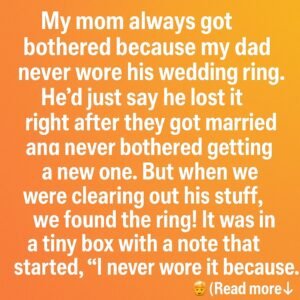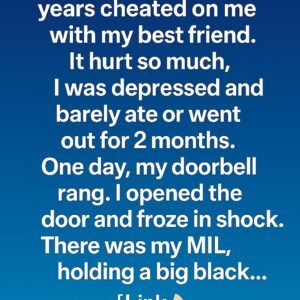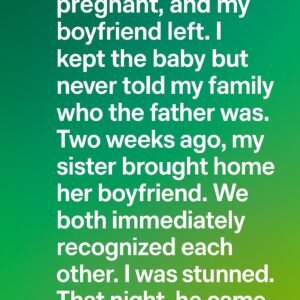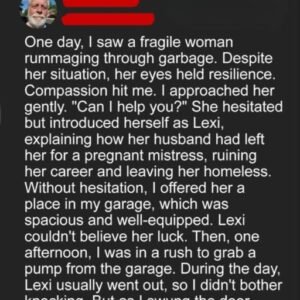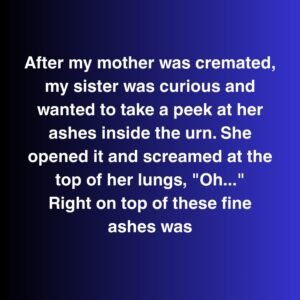The rain had not been invited. It came anyway, sliding down the white columns and glass like a second skin, pooling in the grooves of the stone patio. Ethan Caldwell stood barefoot at the threshold in a T-shirt and gray joggers, coffee in hand, watching the storm press its face against the sliding doors. Somewhere in the house a Roomba sang to itself. Beyond the hedges, security lights stitched cold halos through the palms.
He wasn’t expecting a voice.
Ethan turned, coffee sloshing. She was small—the size of the questions she had learned to ask. No more than seven, maybe, though malnourishment makes people younger at the edges. Barefoot, mud stippling her shins. A hoodie stuck to her shoulders like wet paper. Her curls were clumped to her forehead; her eyes were too large for a night this dark.
“I won’t cause trouble,” she said. “I swear I won’t steal nothing. Just…just for tonight. Please.”
For a second his brain stalled, clicked back, and tried on the old suits: trap, set up, PR stunt. His estate had cameras. He had competitors and enemies and a public he didn’t entirely trust. “Who sent you?” he asked without thinking.
Her brow knit. “Sent me?”
He scanned the garden, the hedges, the roof line. “Is this funny to someone? Are there cameras? Is this a dare?”
“No, please.” She backed up a step at his tone. “Please.”
Max, his golden retriever, padded out from the cedar doghouse, tail low, ears forward. The girl dropped to her knees, coughing so hard her skinny frame bowed around it. It was not the cough of an actress. It rattled something old in Ethan’s chest.
He stepped forward, suspicion falling away like water off a waxed car. “What’s your name?” he asked.
“Anna,” she whispered. “I didn’t have nowhere else to go. Everyone shut their doors. They looked at me like I was dirty. I ain’t. Just tired. Just…”
Her words collapsed into another coughing fit. Tears mixed with rain until he saw the difference—the heat in her cheeks, the eerie blue of her lips, gooseflesh marching up broomstick arms. She was trying to look brave but her body had spent its last coin on getting here.

Ethan’s coffee slipped and thudded on the stone. It didn’t matter. Billion-dollar negotiations never made his hands shake. This did.
“Okay,” he said, and his voice surprised him with its gentleness. “Okay, come here.”
She didn’t move at first, like a stray dog waiting for the kick that always came after the extended hand. “You’re not in trouble,” he said. “I promise.”
He knelt. When he touched her, he flinched—not from disgust, but from the cold burning off her skin. “Jesus,” he murmured. “You’re ice.”
“I won’t bark,” she whispered, eyes half-lidded. “I won’t bark.”
He scooped her up. She weighed less than he expected, a stack of towels with a heartbeat. Max followed them inside, nails ticking on marble, tail swishing like a metronome of concern. Warmth rose to meet them like another world. Mrs. Higgins, his housekeeper, appeared in the hallway and froze at the sight.
“She’s sick,” Ethan said, not meaning it as judgment.
“Yes, sir,” Mrs. Higgins said, and then, “Oh,” in that way people say when their code for the day has to be rewritten. He told her to bring blankets, soup, anything soft. He called Dr. Monroe and the words “come now” fell out of him with an urgency he was not accustomed to feeling.
They made a nest on the guest lounge couch. Anna’s lashes were stuck together like wet feathers. Sweat beaded like stars on her forehead. Ethan sat feeding her spoonfuls of broth, blowing on the metal until it wouldn’t shock her lips. She watched him between sips.
“Are you the man who owns the dog?” she asked.
“I am,” he said.
“Thank you for not making me sleep next to him,” she whispered, drifting. “Not that I mind. He’s nicer than most people.”
That one landed in a place he had boarded up years ago. “You’re safe now,” he told her. She nodded, and while she slept the kind of shallow sleep that measures safety in inches, Ethan watched the rise and fall of her ribs beneath the wool blanket and waited for Dr. Monroe.
Monroe came at three a.m. as if he lived in the doorway of Ethan’s life. Silver hair, slow hands, steadier voice. “Exposure,” he said after listening to Anna’s chest and shining a penlight into her eyes. “Fever, dehydration. Bruises on the ribs—old. She’s been out for a while.”
“Is it serious?” Ethan asked.
“Not yet,” Monroe said. “But another night in that doghouse and we’d be having a different talk.”
He hung the IV bag, gave the fever reducer, left quietly. The rain softened to a whisper on the glass, as if embarrassed by what it had done.
Ethan didn’t sleep. He watched the sky lighten and made a promise he didn’t say out loud.
Bruises are not always blue. Sometimes they are precautions. Sometimes they are paper-thin politeness. In the morning, when Anna awoke and flinched like a deer near a road, Ethan raised his hands to show he had nothing in them.
“I didn’t take anything,” she said quickly. “I swear. I didn’t open no drawers.”
“You didn’t do anything wrong,” Ethan said.
“Are you going to send me away?” she asked.
“I haven’t decided,” he said, and then hated how it sounded. He changed it. “But you won’t leave before you’re warm and fed.”
She ate French toast like it was art—small bites, syrup on her chin, eyes widening at every new texture. “This is better than anything I ever had,” she said. “Did you cook it?”
“No.” He allowed himself a smile. “But I’ll take the credit.”
“Why’d you help me?” she asked halfway through.
He could have said any number of things. Because he had been nine once on a gas station curb waiting for someone to come back who never did. Because he knew what it meant to ask small. Because the cough was too ragged to be rehearsed. He settled for the true and incomplete version.
“Because someone should have.”
Later, she walked the house like a museum. Fingers grazed the wrought iron banister, the polished wood, the framed photos on walls like quiet applause. She stopped at a glass case that contained a single ribbon from a product launch and a photo of Ethan cutting a broad ribbon in front of a tech campus. “Are you famous?” she asked.
“Some people know me,” he said. “Mostly for things I built.”
She looked from the photo to him. “Do any of those things help kids like me?”
He did not answer.
He found her a guest room blue as distant water and told her she could sleep there with the door open. She touched the quilt like it would bite her, and he promised the house would still be there in the morning. He did not say out loud how the house already felt different with her in it, as if the quiet he had once cultivated like a prize were waiting for something to nest inside it.
When she slept that night, he sat in his office not touching the scotch on his desk and typed the words “emergency guardianship” into a search bar. He read about legal limbo and group homes, about shelters with more beds than hands, about systems that used the word “case” more often than the word “child.” He made calls in the morning. He canceled meetings. He booked a child psychologist. He emailed Dr. Monroe for a full workup. He called Linda Vega, the lawyer, the one who told him hard truths and looked like someone who didn’t know how to back up.
“You’re going to need to make this official,” Linda said, and he felt both relief and dread catch at the same place in his chest.
That afternoon, a shadow moved against the gate—the kind that arrives holding a camera like a rifle. By evening, a headline bled across a tabloid site: Billionaire’s Secret Stray? Who Is the Little Girl in Ethan Caldwell’s Yard? The image was blurred and cruel: Anna kneeling in rain beside a doghouse; Ethan in the background like a ghost of himself.
His PR team advised clean detachment. He hung up on them.
He had spent a fortune building a life that kept out noise. The noise poured in, anyway.
Children aren’t scandals. They’re human beings with gifts and damage and a heartbeat that doesn’t belong to a news cycle. Ethan wrote that sentence into a statement, then deleted it and resolved to say it into a camera when it mattered.
Anna’s story began to pour out of her in small, careful cups. “I think my last name starts with a W,” she said one morning. “Walker. My mom used to call me ‘little A.’ We stayed at a motel with red doors. Room eight. And then…then I don’t know.”
“Do you think someone’s looking for you?” he asked.
She studied her hands. “I hope,” she said, and then added quieter, “But it’s okay if not. I like it here.”
They found a photo in her pocket so worn it was almost memory—two faces: a woman with dark curls holding a baby. “That’s her,” Anna said, pressing her thumb to the mother’s cheek. “She smelled like jasmine and cocoa butter.”
When the knock came at the gate, Ethan knew trouble by the way it stood. A tall man in a long tan coat, hair thinning, a smile that had never touched his eyes. “I’m here for my niece,” he boomed into the intercom as the press swiveled. “That rich man’s got her like a pet.”
“Gregory Watts,” Linda said, watching the security feed. “Emergency contact on a birth certificate I found. Congratulations. You’ve met the beginning of our next fight.”
Anna didn’t need to see him to remember. “Uncle Greg,” she whispered, and sat on the stairs hugging Max until her knuckles went white. “He didn’t like the fridge open. He locked it sometimes. When the pot boiled over, he said it was my fault.”
“You don’t have to see him,” Ethan said.
“I don’t want to go back,” she whispered.
“You won’t,” he swore, and felt how sacred a promise is when a child stops flinching long enough to believe it.
It was not a clean war. The Department of Child Services arrived with clipboards and questions. A leak delivered Anna’s testimony to a tabloid. Ethan threatened suit and meant it. He sat beside Anna as she explained to two women with kind eyes and tired hands what safety was and what wasn’t. In the end, an older woman with glasses on a chain wrote “temporary guardianship” on a form and Anna slept through the night without waking.
The courtroom weeks later smelled like polished wood and a hundred tired stories. Gregory’s lawyer said “familial rights” and “due process” so many times the words turned to dust. Linda said “safety” and “present harm” and the words landed like anchors. The judge, an older Black woman who carried her authority like a scar she’d earned, asked Ethan why he took in a child he didn’t know.
“Because she asked to sleep in my doghouse,” he said.
And the judge smiled a little despite herself.
They called Anna to the stand only after Linda knelt and asked if she wanted to do it. Anna did. She walked with her chin level like someone who had learned to balance a book on her head to steady her fear. When Gregory’s lawyer asked if she remembered Uncle Greg taking care of her, her voice shrank and then rebuilt itself mid-sentence. “Sometimes he brought food. Sometimes he made my mom cry.”
“Do you want to live with Mr. Caldwell?” the judge asked.
Anna looked at Ethan and then at the judge. “I want to live where I am,” she said. “Where people remember what my laugh sounds like.”
It wasn’t an ending. It was permission to keep building. The judge gave temporary custody to Ethan and ordered thirty days of evaluation by a court-appointed advocate. The second hearing would be final.
On day ten, Miss Eleanor Bryce arrived with a notepad and a soft gray sweater. She spent hours watching quietly, asking questions that made Ethan ache. She watched Anna feed Max pieces of apple and then talk herself out of giving him the core. She leaned against a doorframe while Anna painted lavender on a canvas because “smells help people trust.” She asked Ethan what he feared most about fatherhood.
“That I’ll accidentally turn her into a story,” he said, and met Miss Bryce’s eyes until the advocate looked away first.
Gregory appealed on day fifteen. A cousin surfaced on day twenty with clean paperwork and clean hands, a woman from Arizona named Yolanda who wanted to do the right thing because the form said she could. She was not cruel. She was not prepared. But sometimes the system thinks those are the same thing.
On day thirty, the judge read from Miss Bryce’s report on a morning so quiet even the air waited.
“Removing Anna from her current home,” Miss Bryce had written, “would be not only harmful but unjust.”
The judge spoke. He spoke about law and about duty. He spoke about blood ties and about the danger in assuming they are enough. Then he signed the order and pushed it away. “Permanent guardianship,” he said. “Mr. Caldwell.”
Ethan exhaled. Anna did not cry. She nodded, like someone who had finally been handed the ending she had written for herself months ago on a rainy night by a doghouse.
Outside, lights flashed. A reporter asked if Ethan had any final words. He did.
“We don’t choose our beginnings,” he said. “But we can choose each other.”
The house changed in ways that did not announce themselves. It smelled different—like pancakes on Saturday and acrylic paint on Sunday and damp dog on rainy afternoons. There were fairy lights strung along a window seat and a shelf of books whose spines made a soft rainbow. The framed photos on the landing gained a new one in between Ethan shaking hands with a president and Ethan cutting a ribbon at a campus: a crayon drawing by Anna of two figures under an umbrella. On the arch over the front gate she had written: Home, For Real.
Ethan and Anna began building something else as the world watched and sometimes applauded and sometimes did neither. They called it The Hearth. It would be a center for kids who knew how a doghouse felt and for the adults who had made a promise to stand between the storm and the child. Anna walked the construction site in a hard hat and asked for beanbags and a room where the only rules would be “no yelling” and “always ask if someone wants a hug before hugging.” She drew a mural of a tree whose branches held words like listen, stay, belong.
Not everyone cheered. Anonymous emails arrived like gnats. A leak in the department supposed to protect her dismissed her as “a billionaire’s project.” Ethan set another meeting with Linda and threatened another lawsuit and meant it. The old world did not give up power easily.
Then one afternoon a letter arrived in careful handwriting. “I’m letting go,” it said, and it was signed “Gregory.” He didn’t deserve to be a hero for that. But sometimes giving up the weapon is the first good thing a man does.
On opening day of The Hearth, the rain returned, soft and apologetic. The mayor said words about community. Linda spoke about systems. Then someone handed Anna a microphone.
“I used to think the world was made of doors I wasn’t allowed to open,” she said. “Shelter doors, courtroom doors, even people’s hearts. Then someone gave me a key. Not a real one. A chance. That key wasn’t just for me.”
The crowd lit small white candles one by one. The building took on a glow that started at the edges and moved inward. Ethan watched from the back with his hands in his pockets and his heart too big for him and thought: This is what wealth is for. Not yachts. Not vanity. Candles in small hands in the rain.
Weeks later, sitting in the lavender garden behind The Hearth, Anna asked to visit her mother’s grave. They drove to a cemetery outside Detroit under a sky that looked like an old penny and left sunflowers on a simple stone. “I changed my name,” she told Tasha. “I kept Anna. I added Caldwell.” She tucked a note under the rock. “I’m not mad anymore,” it said. “I think you did your best. I’m doing mine.”
The ride home was quiet in the way that means someone is at peace.
On a Saturday in June they hiked the ridge above the city. On the bench at the top Anna practiced a speech without notes.
“Some people think healing is forgetting,” she said to the trees. “It’s not. It’s remembering without breaking.”
He didn’t clap, because it wasn’t a performance. But he would have filled the valley with it if she’d asked.
That night, after a small celebration in the garden with cornbread and Motown, after Max curled on the couch like a comma in a sentence that wasn’t finished, after friends had gone and the noise had dissolved into the good kind of quiet, Ethan found a note on his nightstand.
Dear Ethan, it read in pencil that had smudged a little. I know people say they love you all the time, but sometimes you don’t hear it the right way. Thank you for never being afraid of my broken parts. You didn’t just fix me. You let me fix myself. I love you. —Anna
He put it in the drawer with the first drawing she had ever given him, the one from a shelter that said Someone nice will find me, and closed it softly. Outside, the lavender bowed in the breeze. The doghouse stood empty and clean. The house slept with its doors unlocked for the first time in years.
Ethan had built empires; he had broken bread with presidents; he had taught machines to learn his name. None of it had made the house feel alive. A girl asking for a doghouse did.
She would not be a story forever. She would write the next one. He would walk beside her until she asked him to stop, and even then he would stand at the corner and keep watch until she turned and realized she didn’t have to check for him anymore.
Sometimes being a father is learning how to stay when staying is hardest. Sometimes it’s learning when to step back and let someone smaller than you become bigger than what happened to her.
And sometimes it’s opening a door in the rain and saying yes to a stranger who turns out to be your family.
